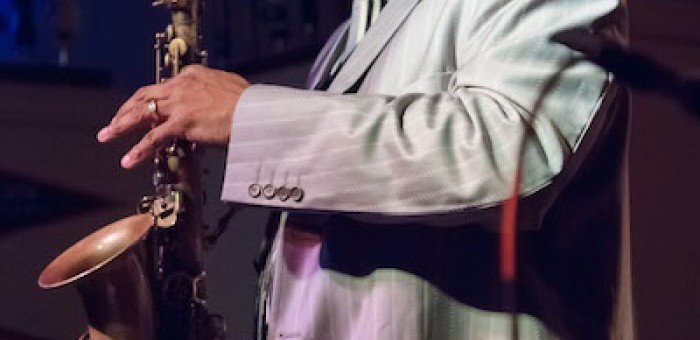Jan 13, 2026 2:09 PM
More Trump-Kennedy Center Cancellations
The fallout from the renaming of the John F. Kennedy Center for the Performing Arts to include President Donald…

James Carter pays tribute to Philadelphia jazz icons during a performance in the city on June 9.
(Photo: William Andrews)When saxophonist James Carter stepped to the mic at Alma Mater, an impressive restaurant, bar and beer garden located in Philadelphia’s Mt. Airy section, he declared the City of Brotherly Love a “parallel universe” to his hometown of Detroit.
The comparison was well-warranted. Both cities are foundational to American music, as evidenced by the Motown and Philadelphia International labels, as well as the countless musicians each city claims for bragging rights: Ron Carter, Donald Byrd, Tommy Flanagan and the Jones Brothers (Thad, Hank, and Elvin) from the Motor City, and Kenny Barron, McCoy Tyner and Pat Martino from Philly, to name a very select few.
Carter’s June 9 gig, produced and curated by local impresario Vena Jefferson as part of an ongoing series, grew from its original conception as a tribute to Philadelphia sax legend Grover Washington Jr. to incorporate the music of Philly icons Jimmy Heath, John Coltrane, Stanley Turrentine (who was born in Pittsburgh but was married to Philly organist Shirley Scott), Lee Morgan and the late r&b singer Billy Paul.
Supporting Carter was a first-rate quintet featuring pianist Adam Faulk, drummer David F. Gibson, Louis Taylor on alto and tenor saxophone and Christian McBride’s father, bassist Lee Smith—all of whom have been swinging in-plain-sight locally for years.
The full house loved Carter’s complete mastery of the three major saxophones. But to describe him as a saxophone player is incomplete. He’s more like a one-man reed section, extending and embellishing the technical limits of each instrument, often in avant-garde, atonal phrasings that would normally clear rooms, if they weren’t delivered in digestible bursts in such an affable and crowd-pleasing manner.
If anyone thought Carter’s shout-out to Grover Washington Jr. was going to be a corny milquetoast tribute, they were quickly disabused of that notion. A sizzling rendition of Washington’s 1980 classic “Winelight” found Carter climbing far into the interstellar regions of the alto saxophone’s upper register. In a way, the song served as Carter’s reminder that Washington, though often hailed as a founding father of smooth jazz, was a skilled multi-saxophonist who knew the tradition. Equally impressive on that selection was Faulk’s fleet-fingered pianism, which carried the harmonic and rhythmic DNA of Tyner and Herbie Hancock.
On Turrentine’s “Minor Chant,” Carter switched to tenor, on which he produced a raw-boned, robust sound. He swung in a sublime, straightahead 4/4 cadence, laced with hypnotic circular breathing.
Carter’s long introduction to Morgan’s “Ceora” on soprano saxophone was a case study in how to exploit all of the multiphonic possibilities of that instrument, before settling in on the composition’s sweet, bossa nova groove. And Heath’s similarly-syncopated “Keep Love Alive,” which was in heavy radio rotation in the ’70s, gave Taylor the opportunity to shine on alto.
But the highlight of the night was Carter’s down-home, Quiet Storm performance of Paul’s r&b hit, “Me And Mrs. Jones.” Paul, who passed away on April 24, was clearly on the minds of the audience members who were still mourning the Philly crooner. The crowd sang along to Carter’s horn with their affirmative hands raised, a gesture that would be at home at the church and the juke joint.
Of course, no Philadelphia tribute is complete without John Coltrane, and Carter nobly acknowledged the saxophone deity with a blistering read of “Impressions.”
At a time when the city of Philadelphia—like a lot of American cities—is struggling to keep jazz alive in the face of budget cuts and reduced radio presence, Carter’s commanding and compelling gig was a ray of hope to a proud jazz enclave.

Belá Fleck during an interview with Fredrika Whitfield on CNN.
Jan 13, 2026 2:09 PM
The fallout from the renaming of the John F. Kennedy Center for the Performing Arts to include President Donald…

Peplowski first came to prominence in legacy swing bands, including the final iteration of the Benny Goodman Orchestra, before beginning a solo career in the late 1980s.
Feb 3, 2026 12:10 AM
Ken Peplowski, a clarinetist and tenor saxophonist who straddled the worlds of traditional and modern jazz, died Feb. 2…

The success of Oregon’s first album, 1971’s Music Of Another Present Era, allowed Towner to establish a solo career.
Jan 19, 2026 5:02 PM
Ralph Towner, a guitarist and composer who blended multiple genres, including jazz — and throughout them all remained…

Rico’s Anti-Microbial Instrument Swab
Jan 19, 2026 2:48 PM
With this year’s NAMM Show right around the corner, we can look forward to plenty of new and innovative instruments…

Richie Beirach was particularly renowned for his approach to chromatic harmony, which he used to improvise reharmonizations of originals and standards.
Jan 27, 2026 11:19 AM
Richie Beirach, a pianist and composer who channeled a knowledge of modern classical music into his jazz practice,…